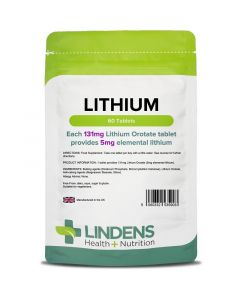
Benefits of Lithium Orotate
What is Lithium Orotate?
Lithium orotate is a compound made from both lithium, which is a naturally occurring alkali metal and orotic acid, a natural compound that enhances the bioavailability of lithium. Lithium orotate is commonly found in supplements, with potential benefits for mood stabilisation, mental health, and cognitive function. Lithium orotate supplements have become a popular alternative to lithium carbonate which is a mood-stabilising medication often prescribed for mood disorders such as bipolar disorder (BD) and depression. The reason for this is that many suggest that lithium orotate may offer advantages over other forms of lithium due to its perceived better bioavailability and lower risk of side effects.
However, the use of lithium orotate for mental health purposes remains controversial. Before considering lithium orotate supplementation, we discuss whether it may be a suitable alternative for some individuals based on scientific evidence.
Is Lithium Orotate really a better alternative?
Lithium orotate supplements are generally considered as an effective alternative for those who do not need to take high dosage prescribed lithium. It is readily available over-the-counter and is at a much milder dosage of lithium between 3-20mg, with perceived fewer side effects. Although lithium orotate is milder, many have reported that they can still feel the benefits of taking it. This could be due to multiple reasons such as its bioavailability, the belief that lithium orotate may enter the brain more readily than lithium carbonate and that ultimately, lithium is the key mood stabilising active ingredient that works to improve mood disorders.
How does it work?
Lithium is a naturally occurring element present in trace amounts in our bodies. It is thought to stabilise mood by influencing the levels of certain neurotransmitters in the brain, such as serotonin and norepinephrine, both mood-regulating hormones. While the exact mechanisms are not fully understood, lithium's mood-stabilising effects are primarily associated with its ability to modulate neural activity.
Health benefits of taking Lithium Supplements:
Alcoholism:
Some clinical research suggests that lithium supplementation could improve cases of alcoholism, the dependency or addiction to consuming alcohol. A study on 42 alcoholic patients found that 150 mg /day of lithium orotate notably resulted in improvements in depression. However, more clinical research needs to be done to solidify claims that lithium orotate can be used to reduce the risk of alcohol relapse.
Mood Disorders:
Lithium, in various forms, has long been used to stabilise mood in bipolar disorder. Proponents of lithium orotate argue that it can provide similar benefits in regulating mood swings associated with bipolar disorder and its mood-regulating and cognitive support can positively impact symptoms of ADHD, anxiety, depression, improving sleep-cycles, and more.
Stress Management:
Lithium is a popular micro-dosing supplement that may potentially promote resilience to stress-related damage in the brain. Some users also report improved cognitive function and mental clarity, which could contribute to better stress management.
How Much Lithium Orotate Should You Take?
Lithium orotate should be taken in micro-doses of no more than 5 mg of elemental lithium daily. Due to the potential for toxicity with lithium, it's essential to be cautious and avoid exceeding recommended dosages.
If you are already taking lithium prescribed by your doctor, it is important to discuss with them whether lithium orotate would be a sufficient alternative for you. Do not take both at the same time.
Who Shouldn’t Take Lithium Orotate?
Lithium orotate may not be suitable for pregnant or breastfeeding women, individuals with kidney or thyroid issues, those on specific medications, children, and people with cardiovascular problems such as irregular heartbeats and a history of abnormal ECG readings.
Due to unclear safety in pregnancy, potential kidney complications, and interactions with medications, it's crucial to consult a healthcare professional before considering lithium orotate, ensuring personalised guidance and risk assessment.
Side Effects
Side effects are fairly uncommon for lithium orotate supplementation when it is taken at the recommended low dosage of 5 mg. However, like with all supplements there are still risks of slight sedation, nausea, diarrhoea, dizziness, muscle weakness, fatigue, and a dazed feeling.
References:
https://www.ncbi.nlm.nih.gov/pmc/articles/PMC8413749/
https://www.nhs.uk/medicines/lithium/
https://pubmed.ncbi.nlm.nih.gov/37356352/
https://pubmed.ncbi.nlm.nih.gov/19523343/
https://pubmed.ncbi.nlm.nih.gov/2404294/
https://pubmed.ncbi.nlm.nih.gov/3718672/
https://www.ncbi.nlm.nih.gov/pmc/articles/PMC3792385/
https://pubmed.ncbi.nlm.nih.gov/35236261/
By Rhysa Phommachanh BA (hons) Specialist Hair and Media Make-up / Head of Digital at Landys Chemist






